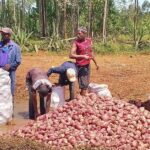By Aghan Daniel I aghandan09@gmail.com
The National Seed Trade Association of Ghana (NaSTAG) is alarmed at the destructive impact of illegal mining, commonly referred to as ‘galamsey,’ on Ghanas agricultural sector and food security.
In a press release dated September 11, 2024, NaSTAG noted the environmental degradation caused by ‘galamsey,’ including deforestation, land erosion, and the contamination of water bodies, which pose a significant threat to the countrys agricultural productivity.
The Association stressed that ‘galamsey’ is compromising seed production in Ghana, a vital pillar for the country’s food security. With the nation already facing a seed production deficit of about 50%, the continued destruction of farmland and pollution of water sources will further exacerbate the crisis.
NaSTAG, one of the most active members of the African Seed Trade Association (AFSTA) warned that if immediate and decisive action is not taken, Ghanas food security and economic stability will be at risk.

Dr. Amos Rutherford Azinu, President of NaSTAG, called for a complete ban on all illegal mining activities, urging the government to declare a state of emergency.
“This issue goes beyond agriculture,” Dr. Azinu said. “It threatens our food and nutrition security, our environment, and even the very fabric of our national security.”
NaSTAG is advocating for an immediate halt to illegal mining activities, followed by a comprehensive environmental assessment to guide efforts for land reclamation and restoration. The Association is also rallying behind civil society organizations and traditional leaders who have been vocal in the fight against ‘galamsey.’
“We must act now to protect the future of agriculture in Ghana,” added Dr Rutherford, urging leaders to prioritize sustainable practices and environmental conservation for the well-being of future generations.
NaSTAG joins a list of other associations that mount pressure on the government to ban the illegal small-scale mining in the country.
These unions are the Ghana Registered Nurses and Midwives Association (GRNMA), the Government and Hospital Pharmacists Association (GHOSPA), the Health Services Workers Union of Ghana (TUC), the Medical Laboratory Professional Workers’ Union (MELPWU), the Mortuary Workers’ Association of Ghana (MOWAG), the Ghana Association of Certified Registered Anesthetists (GACRA), the Health Accounting Staff Association (HASAG), and the Ghana Physician Assistants Association (GPAA).









